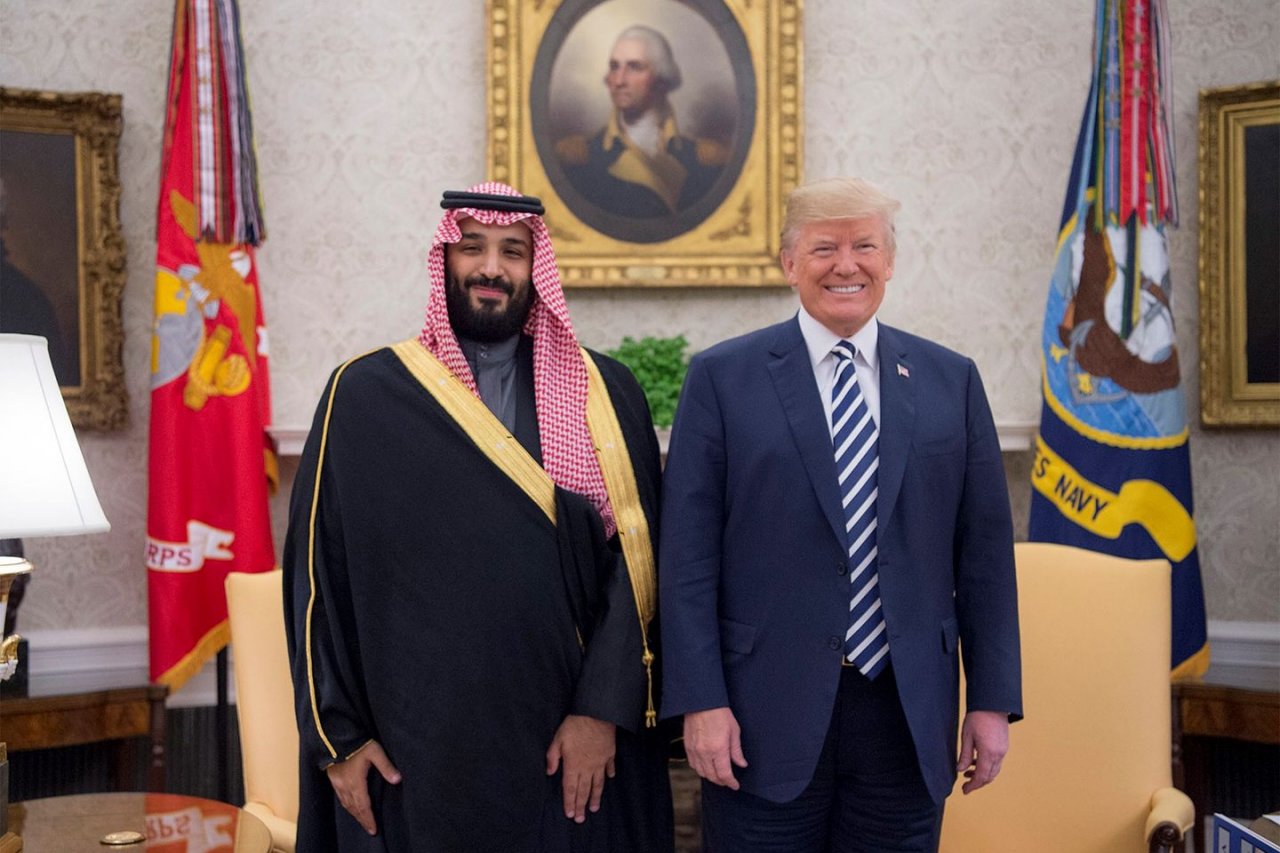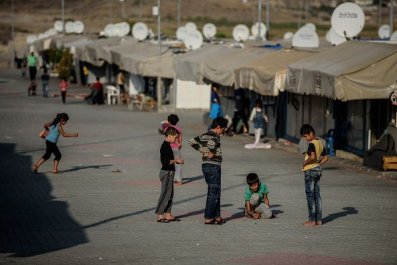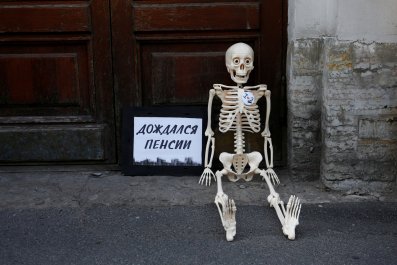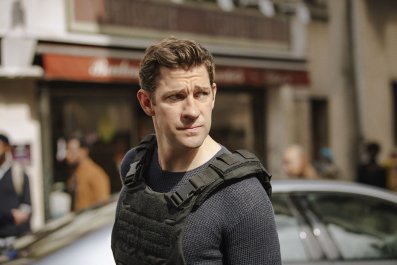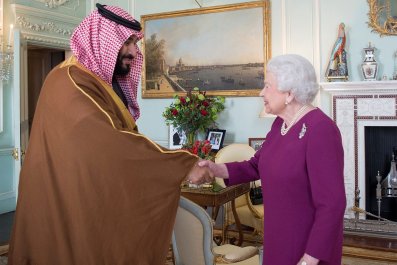It's not often that Ottawa provokes an international brawl. The issue: Saudi Arabia's detention of several prominent women's rights activists. Canada's Foreign Ministry posted a tweet urging their immediate release—and Riyadh took it badly.
Accusing Canada of "blatant interference in the kingdom's domestic affairs," Saudi Arabia pulled its ambassador from Ottawa and expelled his Canadian counterpart, giving him just one day to clear out of Riyadh, the Saudi capital. Trade with Canada was frozen, the managers of Saudi wealth funds were told to sell Canadian holdings, and airline links between the two countries were severed. The kingdom also halted payments for some 10,000 Saudi students enrolled at Canadian universities and 5,000 patients undergoing treatment there.
The fierce reaction bore all the hallmarks of 32-year-old Crown Prince Mohammed bin Salman, commonly known as MBS, the brash new power behind the Saudi throne. Though trade between Canada and the kingdom is minuscule, experts say the prince's message was clear and aimed at a much larger audience. "If you criticize Saudi Arabia, there will be a price to pay," former CIA Middle East analyst Bruce Riedel tells Newsweek.
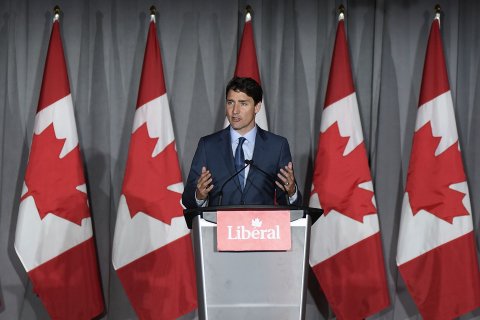
The Trump administration got the message, and Canada, one of America's closest allies and friends, found itself out in the cold. The State Department declined to get involved, advising the two sides to work it out themselves. "We cannot do it for them," said spokeswoman Heather Nauert during a press conference.
The episode showcased the muscular style that Crown Prince Mohammad has brought to Saudi leadership. Gone are the days when Saudi Arabia conducted its foreign policy largely behind the scenes, avoiding direct military confrontation with its foes and quietly projecting its power by funding friendly Arab and Muslim politicians, proxies and media outlets. MBS is now using the kingdom's vast wealth to punish his critics and enemies, both in his bare-knuckled diplomacy and on the battlefield in Yemen, where he's waging war against Iranian proxies. Critics say the episode also exposed President Donald Trump's willingness to abdicate America's moral leadership in defense of human rights—although on Saudi Arabia, that's a position the U.S. surrendered long ago.
In a world where brutal, autocratic countries and their corrupt leaders have been called to account before international tribunals or truth-and-reconciliation commissions, Saudi Arabia has always been the exception. Ever since the discovery of its vast oil reserves in 1938, the kingdom's unique power to stabilize or sabotage the world economy has forced the U.S., its Western allies and even the United Nations to tiptoe around not only Saudi human rights abuses at home but also its financial support for militant Islamist groups such as the Taliban and the Nusra Front, Al-Qaeda's Syrian franchise. And the valuable strategic benefits that Saudi Arabia offers the United States—including its intelligence cooperation on counterterrorism, the fly-over rights it grants U.S. military aircraft in an important region of world, the lucrative market it provides for U.S. military hardware and the role of counterweight to Iran it has assumed—have all insulated the kingdom from U.S. sanctions. Weighed against such considerations, former diplomats say the administration's refusal to support Canada over Saudi Arabia makes perfect sense.
"Human rights and values have never been the cement in this relationship," says Chas Freeman, a former U.S. ambassador to Saudi Arabia. "From the outset, it has always been driven by national interests—both ours and theirs."
'We Are Not Here to Lecture'
Those interests were established on Valentine's Day in 1945, when President Franklin D. Roosevelt met Saudi Arabia's founding father, King Abdulaziz ibn Saud, aboard a U.S. Navy ship anchored in the Suez Canal. In a historic agreement that laid the foundation for U.S.-Saudi relations, the king agreed to guarantee preferential American access to Saudi oil supplies at reasonable prices. In return, Roosevelt pledged the U.S. would protect Saudi Arabia militarily against external enemies.
Since then, that accord has endured the tests of six Israeli-Arab wars in which Washington and Riyadh lined up on opposing sides, as well as the 1973 Arab oil embargo. The oil-for-security bargain has also survived the 9/11 attacks, in which most of the hijackers were Saudi citizens, and the 2003 U.S. invasion of Iraq—a conflict the Saudis presciently foresaw as a strategic blunder that would only strengthen Iran and sharpen their own rivalry with Tehran. It weathered another crucial test when President George H.W. Bush honored Roosevelt's pledge and protected the kingdom from Iraqi forces in the 1991 Persian Gulf War.
But the 1945 meeting also marked the beginning of American deference to Saudi Arabia's absolute monarchy and its social and religious practices, some of which, such as the public beheading of criminals, violated Western and democratic norms. Since then, say historians, every U.S. administration has refrained from commenting publicly about the kingdom's human rights performance, preferring when necessary to address the issue behind closed doors.
On only two occasions in their 73-year relationship have American presidents persuaded Saudi monarchs to improve that performance, says Riedel, now a Middle East expert at the Brookings Institution and author of Kings and Presidents: Saudi Arabia and the United States Since FDR. The first was in 1962, when President John F. Kennedy persuaded Crown Prince Faisal to end the practice of slavery. The second was in 2015, when President Barack Obama convinced King Salman to postpone a second public flogging of jailed dissident Raif Badawi. Badawi, sentenced to 10 years in prison and 1,000 lashes for what a court called "insulting Islam" on his blog, had already received the first 50 lashes.
Jimmy Carter was the first president to make human rights a top priority of his foreign policy. In 1977, the State Department began issuing annual country reports. But neither Carter nor any president since has ever raised the findings of the Saudi country reports with the sitting king, Riedel says. The latest edition notes arbitrary arrests and detention of lawyers, human rights activists and political dissidents; credible allegations of torture; executions without due process; restrictions on freedom of expression, peaceful assembly and religion; and criminalization of homosexuality. Under Sharia, the kingdom's strict Islamic law, capital criminals are beheaded publicly and, in some cases, their torsos are crucified and gibbeted as a warning to the public.
Trump has more than met the U.S. practice of not commenting publicly on Saudi human practices. Arriving in Riyadh in May 2017—his inaugural presidential trip abroad—he became the first U.S. leader to declare publicly that human rights were off his diplomatic agenda. "We are not here to lecture," Trump told his Saudi hosts. "We are not here to tell other people how to live, what to do, who to be or how to worship."
"Every American president since FDR has put oil and strategic affairs before human rights when dealing with Saudi kings in fear of a disruption in the bilateral relationship," says Riedel. "But Trump has taken this abrogation of accountability to a new level of negligence."
The House of Saud and the House of Trump have forged close relations over the past three years. They began with the personal friendship between MBS and Trump's son-in-law, Jared Kushner. That developed during Trump's presidential campaign and has expanded since the 2016 election, based on a mutual rejection of Obama's nuclear deal with Iran and his vision for the Middle East, which encouraged Saudi Arabia to "share" the region with Iran, its main rival.
MBS has said he has no intention of accommodating Iran's ambitions. Two months after he was appointed defense minister in January 2015, he led an Arab military coalition against Iran-backed rebels in Yemen, a campaign Obama reluctantly supported with U.S. logistical assistance. Trump has maintained Washington's behind-the-scenes role in the conflict, now in its fourth year.
The West has mostly lauded the crown prince's first moves, described by some as revolutionary: to wean Saudi Arabia from its dependence on oil, to diversify its economy by opening the kingdom to foreign investment and to institute social reforms. He has sharply reduced the powers of the kingdom's Islamic establishment and its dreaded mutawa'een religious police, who herded people to prayer with riding crops and jailed women for appearing in public with their heads uncovered. Earlier this summer, he lifted the ban on women driving.
But Trump's support has gone further than any other Western leader's; unlike MBS's critics, he has not condemned the crown prince's ruthless campaigns against rivals at home and abroad. In addition to his stalled military campaign in Yemen, MBS organized an Arab boycott of neighboring Qatar as punishment for its alleged close ties to Tehran and terrorists. He also briefly forced Lebanon's Sunni prime minister to resign last year as a protest against Iran-backed Hezbollah, the Shiite militia and political party holding the balance of power in the Lebanese Parliament.
Trump has also been silent on the extra-judicial anti-corruption drive, in which MBS summarily locked up hundreds of wealthy Saudi businessmen, including a dozen high-profile princes, in Riyadh's luxurious Ritz-Carlton hotel until they handed over a reported $100 billion of their assets. According to three intelligence sources, some were tortured into compliance. And since September, he has jailed some 2,000 political prisoners in what analysts say is an effort to crush all opposition to his rule.
Ties That Bind Begin to Fray
And yet, despite the friendly relationship between the Trump and al-Saud families, the larger connection between the United States and Saudi Arabia is beginning to corrode, experts say. They attribute this unraveling to the U.S. disengagement from the broader Middle East, which began under Obama; and the crown prince's moves to forge a more assertive role for Saudi Arabia in the region.
"For the last 10 years, there's a debate that's been going on in this country that the U.S. doesn't want to get more involved [in the Middle East], that there's still a hangover from Iraq and Afghanistan," Yousef al-Otaiba, the ambassador of the United Arab Emirates to the U.S., told the Aspen Security Forum in Colorado in July. "One very senior [U.S.] officer looked at me once and said there's no constituency in the U.S. for us doing more in the Middle East. When we hear that, it means we need to do things on our own."
But some of those things are hurting U.S. interests in the region. The Saudi airstrikes that routinely kill civilians and children in Yemen have drawn global condemnations that now include critics accusing the U.S. of complicity, thanks to the weapons and midair refueling America provides the Saudi-led coalition. Meanwhile, the Saudi blockade of Qatar, home to the Middle East's largest U.S. air base, has shattered the unity of Gulf Cooperation Council, an alliance of six Gulf Arab states that, say former Ambassador Freeman, provided valuable political support for U.S. policies in the region.
Even the energy relationship is fraying. The Saudis have long agreed to increase oil production upon U.S. request if gasoline prices in the West went too high. In June, as Trump contemplated sanctions that would take much of Iran's oil off the market, MBS agreed to the president's appeal and boosted production by another 500,000 barrels a day. But he hasn't raised production further since that increase, a blow to Trump, who is depending on more Saudi oil to keep gas prices from rising.
Then there's the breakdown of a long-term understanding that Washington could rely on Saudi financial support for U.S. foreign policy initiatives. In the 1980s, for example, the Saudis funded a CIA program that supplied weapons to mujahedeen fighters resisting the Soviet occupation in Afghanistan. In some cases, the Saudis even funded operations that had nothing to do with the Middle East, Islam or other Saudi interests: In 1986, they picked up the tab for the weapons the CIA illegally supplied to the Nicaraguan Contras in the Iran-Contra affair.
Under MBS, Saudis have become less generous. Earlier this year, Trump asked Saudi Arabia for troops and $4 billion to help pay for reconstruction efforts in northern Syria. Riyadh has agreed to contribute only $100 million and no troops, the State Department said recently. Saudi officials claim the response reflects their priority to fund and staff the war in Yemen, but the pledge may convey a deeper truth. "The Saudis don't see us as a reliable protector anymore," Freeman says. "The fabric of the relationship has been torn."
That mindset has bled into commercial bonds. For decades, Saudi Arabia has been a reliable market for U.S. military hardware, buying weapons worth more than $100 billion during the Obama administration alone. Trump has said he wants the crown prince to buy an additional $110 billion worth of U.S. military hardware as part of their common front against Iran.
But distrustful of Obama because of his nuclear deal with Iran and wary of Trump's unpredictability, Saudi Arabia prefers to diversify its weapons suppliers, buying, in the last four years, from Britain, Russia, China, Finland and Turkey, among many other countries. An Arab diplomat, who spoke to Newsweek on condition of anonymity, says MBS was at first "amused" when Trump publicly claimed in Riyadh last year that Saudi Arabia had agreed to the $110 billion weapons buy. In fact, no contracts had been signed.
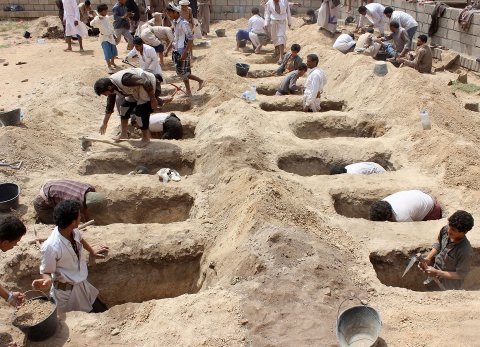
At an Oval Office photo opportunity during the crown prince's U.S. visit in March, the diplomat said MBS grew "annoyed" when Trump turned up the pressure by unexpectedly exhibiting large photos of the military aircraft, weapons and missiles he was trying to sell.
"Saudi Arabia is a very wealthy nation," Trump told reporters as a visibly uncomfortable MBS looked on. "And they're going to give the United States some of that wealth, hopefully in the form of jobs…[and] the purchase of the finest military equipment anywhere in the world."
In fact, even if MBS wanted to buy weapons from the U.S., his options may be shrinking. Incidents like the August 9 Saudi airstrike on a school bus in Yemen that killed 40 children are fueling growing opposition to American involvement in the war. Lawmakers have blocked a $2 billion sale of precision-guided munitions to Saudi Arabia, and a new law mandates an end to midair refueling unless the Pentagon can show the Saudi-led coalition is taking steps to limit civilian casualties and end the conflict in Yemen.
Furthermore, Saudi Arabia's ability to sell U.S. policies to the rest of the Arab and Muslim worlds is diminishing, largely because of the deadly legacies from wars in Iraq and Afghanistan and continuing U.S. military counterterrorism operations in 76 countries. "There was a time when Saudi Arabia, with the legitimacy it has as the guardian of Mecca and Medina in the eyes of 1.6 billion Muslims, could act as America's lawyer in the Muslim world," Freeman says. Today, "we are utterly estranged from Islam."
Over the past two decades, Saudi Arabia has also watched America's credibility in the Arab world evaporate as the U.S. tilted increasingly toward Israel on the issue of the Israeli-Palestinian conflict. In a meeting in New York last March, MBS told Jewish leaders he supported an as-yet-unpublished Israeli-Palestinian peace plan crafted partially by Kushner.
By that time, however, Trump had recognized Jerusalem as Israel's capital and ordered the U.S. Embassy to move there from Tel Aviv, provoking protests across the Arab world, along with deep suspicion of any peace plan his administration might produce. Knowledgeable sources say King Salman, the prince's aging father, convinced him that his support for Kushner's plan was unwise and persuaded him to drop it.
To be sure, some important components of the relationship remain. On the security front, U.S. and Saudi intelligence services still cooperate closely on counterterrorism. Saudi Arabia continues to grant overflight rights to U.S. military aircraft transiting between Europe and South Asia, a valuable perk that enhances America's standing as a global power. And the royal family does prevent Islamist extremists from preaching in the holy cities of Mecca and Medina. These components serve Saudi Arabia, as well as the U.S.
And, of course, the American reluctance to criticize Saudi Arabia also remains. What's really new—you could even say unprecedented—is the relationship at the top between two leaders with strong personalities and increasingly divergent visions for their respective countries, yet who still need what the other has always offered. That's the sort of tension that provokes international brawls.


